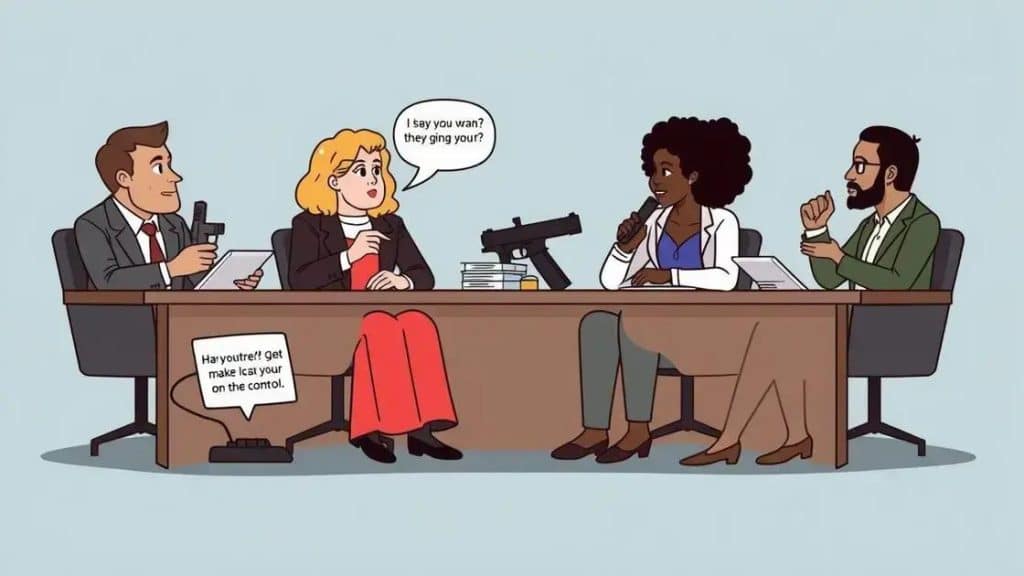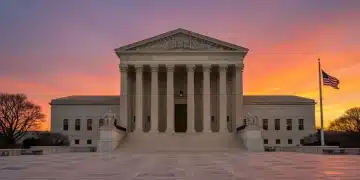Star gun control debate: Exploring the key issues

The star gun control debate centers on the effectiveness of gun laws in reducing violence, public opinions favoring stricter measures, and the ongoing tension between individual rights and community safety.
The star gun control debate is more than just a controversy; it touches on safety, rights, and community values. Have you ever wondered how this discussion shapes our everyday lives?
Understanding the history of the gun control debate
The history of the gun control debate in the United States is complex and multifaceted. It offers insights into the shifting perspectives on firearm regulations and the societal implications of those changes. Over the decades, various events have shaped how Americans view the necessity of gun control.
The Early Years
In the early years of the nation, there were few regulations concerning firearms. The Second Amendment, ratified in 1791, enshrined the right to bear arms, but its interpretation has evolved drastically. Initially, the focus was on militias, reflecting the country’s revolutionary roots.
20th Century Developments
As urbanization increased and violence became a pressing issue, the gun control debate gained momentum. Significant legislations, such as the National Firearms Act of 1934 and the Gun Control Act of 1968, emerged in response to public outcries over gun violence.
- National Firearms Act: Aimed to regulate machine guns and sawed-off shotguns.
- Gun Control Act: Stricter controls on interstate firearms commerce.
- The Impact of High-Profile Incidents: Events like the assassination of President Kennedy fueled demands for stricter controls.
These early measures established a precedent, highlighting the tensions between individual rights and public safety. As such debates continued, more recent events have kept the issue relevant in national discourse.
Recent Trends
From the 1990s onward, high-profile shootings have reignited the gun control debate. Incidents like the Columbine High School shooting in 1999 and the Sandy Hook Elementary School tragedy in 2012 have prompted renewed discussions about gun laws. Advocates for change argue for improved background checks and restrictions on certain types of firearms.
These events have also given rise to various movements, such as March for Our Lives, which emphasizes the need for a comprehensive approach to gun safety. As activism grows, the dialogue around gun control becomes more complex, involving voices from all sides.
The growing divide in public opinion signifies the challenges that lie ahead in creating effective legislation. Different states implement different laws, reflecting the diverse cultural and political landscapes across the country.
Key arguments from both sides of the issue
The gun control debate involves a variety of key arguments from both sides. These arguments often reflect deep-seated beliefs about rights, safety, and public policy. Understanding these perspectives is essential to grasping the complexities of the issue.
Supporters of Gun Control
Proponents of stricter gun control laws argue that it can lead to lower rates of gun violence and crime. They emphasize the following points:
- Public Safety: Stricter regulations can help prevent dangerous individuals from obtaining firearms.
- Reducing Gun Deaths: Evidence suggests that countries with more stringent gun laws often experience fewer gun-related deaths.
- Enhanced Background Checks: Advocates argue for comprehensive background checks to ensure only responsible citizens own guns.
Many supporters also believe that common-sense measures, such as waiting periods and limitations on firearm types, are necessary for maintaining public safety.
Opponents of Gun Control
On the other hand, opponents of gun control argue that such measures infringe upon individual rights. They pose several objections:
- Second Amendment Rights: Many view gun ownership as a fundamental right protected by the Constitution.
- Self-Defense: Firearms are often seen as vital tools for personal protection.
- Effectiveness of Laws: Critics argue that criminals do not follow laws, suggesting that gun control may not effectively reduce crime.
Additionally, they contend that restricting law-abiding citizens’ access to guns only limits their ability to protect themselves.
The conversation surrounding gun control is deeply divisive. Each side presents compelling arguments that reflect their values and concerns. This ongoing discussion continues to evolve as new data and events unfold, influencing public opinion and policy.
The impact of gun laws on crime rates

The relationship between gun laws and crime rates is a significant aspect of the ongoing discussion about gun control. Understanding how laws affect crime can provide important insights into public safety and policy effectiveness.
Examining the Data
Studies have shown varying outcomes regarding the effect of gun laws on crime rates. Some research suggests that stricter gun regulations can lead to reduced violence, while other studies indicate minimal impact. This disparity often leads to debates among researchers and policymakers.
- States with strict laws: Often report lower rates of gun-related deaths.
- Laws vs. Criminal Behavior: Many argue that criminals may not adhere to gun laws, questioning their overall effectiveness.
- Comparative Studies: Countries with comprehensive gun control tend to experience fewer mass shootings.
This evidence highlights the complexities in analyzing the relationship. Researchers often consider factors such as socioeconomic conditions, cultural attitudes towards guns, and the enforcement of laws.
The Role of Enforcement
Another important factor is how well the gun laws are enforced. Even the best regulations can fall short if they are not properly implemented. Communities with active law enforcement and resources for monitoring gun sales may have better outcomes in reducing crime.
Moreover, public awareness and community programs can play a role in enhancing the effectiveness of gun laws. Education about safe firearm handling and storage can contribute significantly to reducing accidental shootings and gun theft.
Understanding the impact of gun laws on crime rates requires a multifaceted approach. As data continues to evolve, so will discussions on how to balance public safety with individual rights. This ongoing dialogue helps shape the future of gun policy across the nation.
Public opinion on gun control measures
Public opinion on gun control measures fluctuates based on various factors, including recent events, demographic trends, and the evolving landscape of policy discussions. Understanding how different groups view these measures can provide insights into the broader gun control debate.
General Trends
Polls often show a significant portion of Americans support stricter gun laws. According to various surveys, many believe that such regulations are necessary to improve safety. Public sentiment can shift dramatically after mass shootings, leading to increased calls for action.
- Support for Universal Background Checks: Many support policies requiring background checks for all gun buyers, including private sales.
- Assault Weapon Bans: There is notable support for banning certain types of military-style firearms.
- Increased Gun Safety Training: Citizens favor measures that promote education and training for safe gun ownership.
However, support can vary significantly based on region, age, and political affiliation. Younger voters tend to be more in favor of stricter laws, while older generations may hold different views.
Divided Perspectives
The debate around gun control often reveals stark divisions. For example, research shows that urban areas generally favor more stringent gun laws compared to rural regions, where gun ownership is often seen as a vital part of life.
Political affiliation also plays a crucial role in shaping opinions. Democrats typically advocate for more regulations, while Republicans often prioritize individual rights and oppose restrictive laws. As public conversations continue, advocacy groups on both sides actively work to sway opinions and influence policy.
Understanding these nuances in public opinion is critical for shaping the future of gun legislation. Ongoing discussions will likely continue to reflect the changing perspectives of the American public in this complex and emotional debate.
Future predictions for gun legislation
The future of gun legislation is a topic of much debate and speculation. As societal attitudes evolve, the potential for new laws and amendments fluctuates. Understanding the trends and factors influencing these changes can provide insight into what may come next.
Emerging Trends
One trend that is becoming increasingly clear is the push for more comprehensive gun safety laws. Many advocates are calling for stricter measures, including universal background checks and bans on high-capacity magazines. This movement is gaining traction, especially among younger voters who prioritize safety and advocacy.
- Increased Advocacy: Grassroots organizations are mobilizing communities to push for change.
- Legislative Proposals: More states are introducing bills aimed at tightening gun control measures.
- Public Influence: Public opinion polls indicate rising support for stricter gun laws.
Additionally, technology may play a significant role in future legislation. Innovations such as smart gun technology are being discussed as potential solutions to enhance safety and accountability.
The Role of Mass Shootings
Tragic events that result in mass shootings often catalyze discussions around gun laws. Each incident has the potential to shift public opinion and pressure lawmakers to consider new regulations. As these occurrences continue, the demand for action may lead to more substantial changes in legislation.
In some regions, we might see a divide between those who seek more restrictions and those who advocate for the protection of individual gun rights. The ongoing struggle between these perspectives will undoubtedly shape the legislative landscape.
As debates unfold, it is essential to consider the implications of new laws and how they could impact communities. Gun legislation will likely continue to evolve in response to social movements, public outcry, and shifts in political power.
FAQ – Common Questions About the Gun Control Debate
What is the main argument for stricter gun control?
The main argument is that stricter gun control laws can help reduce gun violence and improve public safety.
How do public opinions on gun control vary?
Public opinions vary significantly based on factors like age, location, and political affiliation, with younger generations typically favoring stricter laws.
What impact do mass shootings have on gun legislation?
Mass shootings often lead to increased calls for stricter laws and can shift public opinion towards supporting more regulations.
What are some future predictions for gun legislation?
Future predictions include a push for comprehensive background checks, the introduction of smart gun technology, and ongoing debates about balancing rights and safety.





